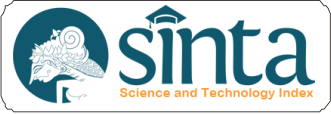Kajian Aksiologi Cyber Counseling di Era Disrupsi
Abstract
Era disrupsi menjadi fokus utama sejalan dengan kemajuan tekologi, tepatnya di masa pandemi tahun 2020 Indonesia mengalami perubahan besar. Terkhusus dampak saat ini pada bidang pendidikan, guru bimbingan dan konseling dipaksa melek teknologi agar pemberian layanan bimbingan dan konseling di sekolah dapat terlaksana sesuai tujuan pendidikan. Penelitian ini bertujuan memberi penambahan pengetahuan dan pembelajaran bagi guru Bimbingan dan Konseling agar nantinya ketika melaksanakan cyber counseling di satuan pendidikan mampu mengaktualisasikan kompetensi yang dimiliki untuk memperoleh output peserta didik yang berkompeten sesuai tujuan pendidikan di Indonesia. Teknik pengumpulan data meliputi dokumentasi dan beberapa artikel ilmiah. Teknik analisis melalui kajian pustaka (literatur research) dari beberapa sumber yang relevan. Hasil dari studi literatur menunjukkan bahwa penggunaan cyber counseling oleh guru bimbingan dan konseling dalam layanan di sekolah pada prinsipnya memiliki tujuan yaitu 1) untuk memfasilitasi layanan bimbingan dan konseling siswa di sekolah, dan 2) peningkatan kinerja dari guru bimbingan dan konseling yang selama ini tidak terjadwal di dalam kurikulum sekolah dengan memperhatikan etika layanan bimbingan dan konseling yang sudah disepakati. Namun cyber counseling memiliki keterbatasan di antaranya jaringan internet yang tidak merata di setiap daerah, dan tidak terhubung secara langsung atau kontak secara tatap muka (face to face). Fakta dengan hadirnya penggunaan cyber konseling di sekolah menjadi solusi alternatif bagi pelaksanaan layanan bimbingan dan konseling di masa pandemi covid 19 maupun pasca pendemi di sekolah.
References
At Thaariq, Z. Z. (2021). Pendayagunaan Internet Sebagai Aksiologi Belajar Pembelajaran Era Digital. Jurnal Pendidikan Terbuka Dan Jarak Jauh, 22(1), 37–48. https://doi.org/10.33830/ptjj.v22i2.1918.2021
Avalos-Mejia, A. M., García-Cruz, J. C., de la Peña, J. E., Garrido-Acosta, O., & Juárez-Cedillo, T. (2021). Reduction of inappropriate prescriptions in older adults through the support of Asynchronous Geriatric Counseling Online (AGAlink): Implemented in primary care. PLoS ONE, 16(November), 1–12. https://doi.org/10.1371/journal.pone.0258414
Beidoʇlu, M., Dinçyürek, S., & Akintuʇ, Y. (2015). The opinions of school counselors on the use of information and communication technologies in school counseling practices: North Cyprus schools. Computers in Human Behavior, 52, 466–471. https://doi.org/10.1016/j.chb.2015.06.022
Budianto, A. E., Aziz, A., & Hidayah, N. (2019a). ICT application in cyber counseling as a teacher accelerator with optimizing WhatsApp based mobile computing. Journal of Physics: Conference Series, 1375(1). https://doi.org/10.1088/1742-6596/1375/1/012006
Cilliers, L., & Chinyamurindi, W. (2020). Perceptions of cyber bullying in primary and secondary schools among student teachers in the Eastern Cape Province of South Africa. Electronic Journal of Information Systems in Developing Countries, 86(4), 1–10. https://doi.org/10.1002/isd2.12131
Davis, N., & Schmidt, C. (2016). Cyberbullying and Cyber Abuse Intervention: The Three-Tiered Model for Schools. Journal of Creativity in Mental Health, 11(3–4), 366–377. https://doi.org/10.1080/15401383.2016.1238792
Fadhilah, M. F., Alkindi, D., & Muhid, A. (2021). Cyber Counseling Sebagai Metode Meningkatkan Layanan Bimbingan dan Konseling di Sekolah: Literature Review. Counsellia: Jurnal Bimbingan Dan Konseling, 11(1), 86. https://doi.org/10.25273/counsellia.v11i1.8393
Fahyuni, E. F., Taurusta, C., Hariastuti, R. T., & By Arifin, M. B. U. (2022). Improving Students Learning Strategy Trough Mobile Counselling Online Application. Journal of Educational and Social Research, 12(5), 185–196. https://doi.org/10.36941/jesr-2022-0133
Fang, L., Bogo, M., Mishna, F., Murphy, L., Gibson, M. F., Griffiths, V., & Regehr, G. (2013). Development and Initial Evaluation of the Cyber-Counseling Objective Structured Clinical Examination (COSCE). Research on Social Work Practice, 23(1), 81–94. https://doi.org/10.1177/1049731512459966
Foon, L. W., Zainudin, Z. N., Yusop, Y. M., & Wan Othman, W. N. (2020). E-counselling: The intention, motivation and deterrent among school counsellors. Universal Journal of Educational Research, 8(3 3C), 44–51. https://doi.org/10.13189/ujer.2020.081605
Franco-Torres, M., Rogers, B. C., & Harder, R. (2021). Articulating the new urban water paradigm. Critical Reviews in Environmental Science and Technology, 51(23), 2777–2823. https://doi.org/10.1080/10643389.2020.1803686
Gading, I. K. (2020). The Development of Cyber Counseling as a Counseling Service Model for High School Students in the Digital Age. JPI (Jurnal Pendidikan Indonesia), 9(2), 301. https://doi.org/10.23887/jpi-undiksha.v9i2.25469
Hamidy, A., & Purboningsih, D. (2016, February). Pembelajaran Kolaboratif Berbasis Online Dalam Perkuliahan Filsafat Pendidikan Matematika. In PRISMA, Prosiding Seminar Nasional Matematika (pp. 138-144).
Han, S.-M. (2008). Cyber Counseling in the U.S.A. and South Korea: Attitudes and needs of the Millennial Generation and the Net Generation on campus. http://csaweb108v.csa.com.proxy.lib.wayne.edu/ids70/view_record.php?id=459&recnum=36&log=from_res&SID=r6b4cpqvhi77fq1a0g8dsn4ud0
Haryati, A. (2020). Online Counseling Sebagai Alternatif Strategi Konselor dalam Melaksanakan Pelayanan E-Counseling di Era Industri 4.0. Bulletin of Counseling and Psychotherapy, 2(2), 27–38. https://doi.org/10.51214/bocp.v2i2.33
Kirana, D. L. (2019). Cyber Counseling sebagai Salah Satu Model. Al-Tazkiah, 8(1), 57–61. https://journal.uinmataram.ac.id/index.php/altazkiah/article/download/1101/568
Kw, S., & S., M. A. B. (2019). Konseling Individu Melalui Cyber Counseling Terhadap Pembentukan Konsep Diri Peserta Didik. Bikotetik (Bimbingan Dan Konseling Teori Dan Praktik), 3(1), 6. https://doi.org/10.26740/bikotetik.v3n1.p6-10
Lei, H., Xiong, Y., Ming, M., Zhang, J., & Cai, Z. (2021). Children and Youth Services Review The relationship between ICT literacy and academic achievement among students : A meta-analysis. Children and Youth Services Review, 127(June), 106123. https://doi.org/10.1016/j.childyouth.2021.106123
León, L. P. de, & Castro, P. L. (2014). ICT in Career Guidance. A Case Study of a “Blended Learning” Career Guidance Programme for Music Students. Procedia - Social and Behavioral Sciences, 116, 2049–2058. https://doi.org/10.1016/j.sbspro.2014.01.518
Levina, V., Zubanova, S., & Ivanov, A. (2021). Axiological linguistics and teaching of Russian as a foreign language in the context of distance learning against the backdrop of the pandemic. XLinguae, 14(1), 212–227. https://doi.org/10.18355/XL.2021.14.01.17
Maros, H., & Juniar, S. (2016). Permendikbud No.111 Tahun 2014. 1–23.
Muqit, A. & Mighfar, S. (2020). Ontologi, Epistemologi Dan Aksiologi Pendidikan Pesantren Pada Era Modern. Edupedia, 5(1), 11–16. https://doi.org/10.35316/edupedia.v5i1.876
Miharja, S. (2020). Menegaskan Definisi Bimbingan Konseling Islam, Suatu Pandangan Ontologis. At-Taujih : Bimbingan Dan Konseling Islam, 3(1), 14. https://doi.org/10.22373/taujih.v3i1.6956
Mishna, F., Bogo, M., & Sawyer, J. L. (2015). Cyber Counseling: Illuminating Benefits and Challenges. Clinical Social Work Journal, 43(2), 169–178. https://doi.org/10.1007/s10615-013-0470-1
Mishna, F., Levine, D., Bogo, M., & Van Wert, M. (2013). Cyber Counselling: An Innovative Field Education Pilot Project. Social Work Education, 32(4), 484–492. https://doi.org/10.1080/02615479.2012.685066
Mishna, F., Tufford, L., Cook, C., & Bogo, M. (2013). Research note - A pilot cyber counseling course in a graduate social work program. Journal of Social Work Education, 49(3), 515–524. https://doi.org/10.1080/10437797.2013.796855
Musharraf, S., & Anis-ul-Haque, M. (2018). Impact of cyber aggression and cyber victimization on mental health and well-being of Pakistani young adults: The moderating role of gender. Journal of Aggression, Maltreatment and Trauma, 27(9), 942–958. https://doi.org/10.1080/10926771.2017.1422838
Nurasyah, Fadhillah Putri, R., & Fitriani, E. (2022). Students’ Understanding About Cyber Counseling Based on Zoom Meet. International Journal of Social Sciences and Humanities Invention, 9(01), 6779–6782. https://doi.org/10.18535/ijsshi/v9i01.07
Prasetiawan, H., & Prasetiawan, H. (2016). Cyber Counseling Assisted With Facebook To Reduce Online Game Addiction. GUIDENA: Jurnal Ilmu Pendidikan, Psikologi, Bimbingan Dan Konseling, 6(1), 28. https://doi.org/10.24127/gdn.v6i1.409
Rahmadani, R., & Karneli, Y. (2021). Ontologi , epistemologi , aksiologi dalam psikologi konseling. Jurnal Pendidikan Tambusai, 5(1), 859–862.
Resti Okta Sari. (2021). Cyber Counseling Services in Covid-19 Pandemic. Al-Isyrof: Jurnal Bimbingan Konseling Islam, 3(1), 8–21. https://doi.org/10.51339/isyrof.v3i1.226
Sari, M. P., & Herdi, H. (2021). Cyber Counseling : Solusi Konseling di Masa Pandemi. Jurnal Paedagogy, 8(4), 579. https://doi.org/10.33394/jp.v8i4.3949
Situmorang, D. D. B. (2020). Online/Cyber Counseling Services in the COVID-19 Outbreak: Are They Really New? The Journal of Pastoral Care & Counseling : JPCC, 74(3), 166–174. https://doi.org/10.1177/1542305020948170
Skipor, S. I., & Vorobieva, A. E. (2021). Psychological characteristics of psychologists’ adaptation to online counseling during the covid-19 pandemic. Russian Psychological Journal, 18(1), 61–73. https://doi.org/10.21702/rpj.2021.1.5
Suranata, K., Rangka, I. B., & Permana, A. A. J. (2020). The comparative effect of internet-based cognitive behavioral counseling versus face to face cognitive behavioral counseling in terms of student’s resilience. Cogent Psychology, 7(1). https://doi.org/10.1080/23311908.2020.1751022
Syam, S. (2020). Reducing Student Learning Anxiety Through Cyber Counseling-Based Individual Counseling Services. Akademika, 9(02), 105–113. https://doi.org/10.34005/akademika.v9i02.1048
Tyshchenko, O., Korolyov, I., & Palchevska, O. (2021). Cultural and cognitive structure of the omen: Epistemology, axiology and pragmatics. Wisdom, 18(2), 137–151. https://doi.org/10.24234/WISDOM.V18I2.476
Vila-Tojo, S., Sabucedo, J. M., Andrade, E., Gómez-Román, C., Alzate, M., & Seoane, G. (2022). From scarcity problem diagnosis to recycled water acceptance: A perceptive-axiological model (PAM) of low and high contact uses. Water Research, 217(March). https://doi.org/10.1016/j.watres.2022.118380
Winkler, P., Kretschmer, J., & Etter, M. (2021). Between tragedy, romance, comedy and satire: narratives of axiological progress in public relations. Journal of Communication Management, 25(4), 353–367. https://doi.org/10.1108/JCOM-11-2020-0145
Zainudin, Z. N., Asri, A. S., Talib, M. A., Hassan, S. A., Ahmad, N. A., & Yusop, Y. M. (2020). The Prevalence of Cyber-Counselling: A Systematic Literature Review on Effectiveness and Preferences. International Journal of Academic Research in Business and Social Sciences, 10(10). https://doi.org/10.6007/ijarbss/v10-i10/7897











